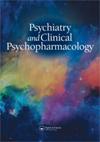The psychometric properties of the Generalized Anxiety Disorder scale (GAD-7) among Korean university students
IF 0.5
4区 医学
Q4 PHARMACOLOGY & PHARMACY
引用次数: 40
Abstract
ABSTRACT OBJECTIVE: The seven-item Generalized Anxiety Disorder scale (GAD-7) is a practical self-report measure that screens for the severity of Generalized Anxiety Disorder in primary care. Previous studies have shown that the GAD-7 is theoretically sound, but the results regarding its psychometric properties have been somewhat inconsistent with both adult and student samples. Despite these findings, the psychometric properties of the GAD-7 have remained untested among Korean university students, for whom the identification of efficient measures of these constructs is especially important. To determine the psychometric properties of the GAD-7, the present study examined the internal consistency, convergent validity, and underlying factor structure of the GAD-7 with a sample of Korean university students. METHODS: The sample consisted of 582 students attending a four-year university in South Korea. All participants completed the Korean version of the GAD-7, the Depression Anxiety, and Stress Scale–21 (DASS-21), and the Patient Health Questionnaire (PHQ-9). The factor structure of the GAD-7 was assessed by exploratory factor analysis (EFA) and confirmatory factor analysis (CFA), and its convergent validity was determined by investigating its correlations with the DASS-21 and PHQ-9. RESULTS: CFA procedures confirmed that a modified one-factor model was an acceptable solution. The internal consistency of the scale was excellent. The GAD-7 showed a moderate to strong correlation with the three subscales of the DASS-21 and with the PHQ-9, confirming convergent validity. CONCLUSIONS: The findings indicate that the modified GAD-7 is a reliable and valid instrument for assessing generalized anxiety symptoms in university students. Its use for research and health care practice is warranted.韩国大学生广泛性焦虑障碍量表(GAD-7)的心理测量特征
摘要目的:7项广泛性焦虑障碍量表(GAD-7)是一种实用的自我报告量表,用于筛查初级保健中广泛性焦虑障碍的严重程度。先前的研究表明,GAD-7在理论上是合理的,但关于其心理测量特性的结果在成人和学生样本中都有些不一致。尽管有这些发现,GAD-7的心理测量特性仍未在韩国大学生中进行测试,对他们来说,确定这些构念的有效测量方法尤为重要。为了确定GAD-7的心理测量特性,本研究以韩国大学生为样本,检验了GAD-7的内部一致性、收敛效度和潜在因素结构。方法:样本由韩国一所四年制大学的582名学生组成。所有参与者都完成了韩国版的GAD-7、抑郁、焦虑和压力量表-21 (DASS-21)和患者健康问卷(PHQ-9)。采用探索性因子分析(EFA)和验证性因子分析(CFA)评估GAD-7的因子结构,并通过考察其与DASS-21和PHQ-9的相关性来确定其收敛效度。结果:CFA程序证实,改进的单因素模型是可接受的解决方案。该量表的内部一致性良好。GAD-7与DASS-21的三个分量表和PHQ-9表现出中等至强的相关性,证实了收敛效度。结论:改进后的GAD-7是一种可靠、有效的评估大学生广泛性焦虑症状的工具。将其用于研究和保健实践是合理的。
本文章由计算机程序翻译,如有差异,请以英文原文为准。
求助全文
约1分钟内获得全文
求助全文
来源期刊

Psychiatry and Clinical Psychopharmacology
Medicine-Psychiatry and Mental Health
CiteScore
1.00
自引率
14.30%
发文量
0
期刊介绍:
Psychiatry and Clinical Psychopharmacology aims to reach a national and international audience and will accept submissions from authors worldwide. It gives high priority to original studies of interest to clinicians and scientists in applied and basic neurosciences and related disciplines. Psychiatry and Clinical Psychopharmacology publishes high quality research targeted to specialists, residents and scientists in psychiatry, psychology, neurology, pharmacology, molecular biology, genetics, physiology, neurochemistry, and related sciences.
 求助内容:
求助内容: 应助结果提醒方式:
应助结果提醒方式:


